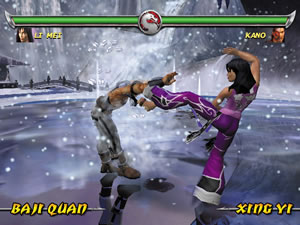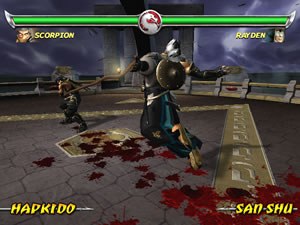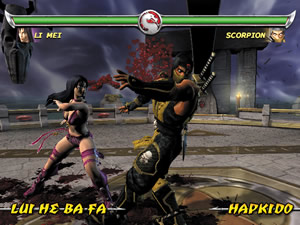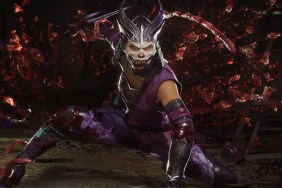Can’t get enough of your death, babe.
When I brought Midway’s Mortal Kombat: Deadly Alliance home from the office
and popped it into my PS2, I really wasn’t sure what I was in for. I’d never played
the side-scrolling action monstrosities starring Sub-Zero
and Jax and I spent very little time with Mortal
Kombat 4, so I had little appreciation for the decline of everybody’s favorite
gore-fest since Mortal Kombat 3 was in the arcades.
But fear not, ye ministers of gore, ye acolytes of evisceration – Mortal
Kombat has come again, and delivered Midway from its lost Haven.
Not without its problems, Mortal Kombat: DA is an entertaining fighting
game if you’re playing by yourself and a real hoot when playing with friends.
The easy fatalities and combos lend great pick-up-and-play value, and the ghastly
animations and tons of blood will even entertain those watching.
The
intro reveals that sorcerer Quan Chi has escaped his ethereal prison and discovered
an undead army of rotting samurai just waiting to be revived with some freshly
slain souls. So Quan Chi seeks out Professional Soul Sucker Shang Tsung, and
together they form (!!!!) The Deadly Alliance.
This storyline is oddly implemented in the game. Do Shang Tsung and Quan Chi
start the Mortal Kombat tournament? Is the tournament only symbolic of what
is really happening? What is really happening? And why isn’t Moloch the
last boss, since he’s the super Oni (God) of death?
Before getting to not answering these questions, a word on characters. Old
staples are here, including an older Subzero, a friskier Kung Lao and a violent-as-ever
Scorpion. There are a few new characters as well, the coolest being Kenshi,
a blind Taoist master. He’s like a Jedi, only without the robes.
Deadly Alliance comes with the standard Arcade and Versus modes, but
departs from the normal scheme of things with the Konquest Mode, which is a
sort of training mode with a story line, and the Krypt, which is a room with
more than 650 coffins, each containing a bonus goodie.
To access the Konquest Mode you have to create a User Profile, so that when
you earn coins for completing tasks in Konquest mode and killing suckas in the
Arcade mode, you can save them and use them to purchase goodies in the Krypt.
Each coffin in the Krypt has a coin value on it, and if you want the sweet
unlockables, you’ll have to pay for ’em. It’s a cool way to handle unlockables,
as it rewards you for playing well rather than just entering a bunch of stupid
directional cheats.
What’s odd about Konquest Mode is that it’s essentially a Training Mode with a fleshed-out story line for each character. It never has any real matches. You’ll get this blurb about this huge fight that’s about to take place because you’re Raiden and you hate Quan Chi’s guts, and then you’ll have to combo him like three times to move on, as opposed to shocking him until he explodes. And the worst part is, after you complete the mission, your sworn enemy bows to you! This is not what one would call proper integration of a story-line…but it’s a great way to learn the combos and moves.
The combat itself is refreshing in that it is extremely easy to pick up. The special moves always work, and the combos all work on the same rhythm, which is slow and steady.
New to the series are different fighting styles for each player that can be
toggled at the press of a button. Each player has two unarmed fighting styles,
such as Hapkido or Karate, and one armed fighting style, such as a Ninja Sword
for Scorpion or nunchakus for Johnny Cage. Each fighting style includes an authentic
stance and several authentic base moves.
It seems like the developers paid for authenticity with consistency, as there
is no real standard for what particular buttons do. In order to figure this
out, you must consult Konquest mode, but even Konquest mode glosses over the
basic moves to focus on the pre-programmed combo system. Since each stance has
about 12 basic moves, and there are three stances, there is a slew of basic
moves, and figuring out by yourself which ones are useful is a helluva task.
But that also means that the game has depth, which is sort of new to Mortal
Kombat. The multi-pronged fighting leads to a monstrous number of ways to
kick butt, giving the game some terrific depth.
Some may find to their dismay that the special moves have been tweaked and
that several Mortal Kombat staples (Raiden’s torpedo and Scorpion’s teleport,
for example) have been left out of the game entirely. This is clearly due to
the emphasis on the combo-system, as most special moves are primarily useful
in ending or beginning a combo. There aren’t that many combos in Deadly Alliance,
and practically none that hit low, which makes blocking them easy for human
and computer players alike.
 The
The
fatalities, of course, rock, and are easy enough to execute. Unfortunately,
there is only one fatality per player, which is definitely a shame. Still, only
one insanely gory fatality per player puts Mortal Kombat: DA way ahead
of the competition in terms of visceral thrills.
Mortal Kombat: DA is a fully 3D game, as the player can move forward
and backward and in a circle around his opponent (by either double-tapping up
or down). However, you cannot mix axes of movement, which is very frustrating
when trying to escape a corner trap. You cannot, for example, move upwards on
the screen and back at the same time, or move down and draw closer to an opponent
at the same time. Movement one way excludes movement in any other direction,
which makes it a little clunky.
Graphically, though, Deadly Alliance is impressive with cool, detailed
backgrounds, large, well-animated characters, and gory special moves and fatalities.
Impale a player with your sword and watch the blood pour from his stomach, or
cut his face and watch as he’s blinded by his own blood. And yes, the red stuff
stays around for a while. By the end of a fight, the arenas are covered in scarlet.
The sound is mediocre and could use some more over-the-top effects to match its visual gore. You’ll still find the great ‘Fatality’ and ‘ Get Over Here!’ voices, at least.
Overall, Mortal Kombat: Deadly Alliance for the PS2 is a good fighting
game with a great gore factor. While the control limitations and simple combos
will have you weary of the single-player modes in a couple days, the never-ending
blood and neat three stance system will make kicking your friends’ asses all
the more enjoyable. And, even better, give them a half-hour and they might start
kicking your ass, too.

-
Fun to play with friends
-
Easy to pick up
-
Ultra gory!
-
Cool new fighting styles
-
Somewhat thin single-player gameplay
-
Mobility problems







